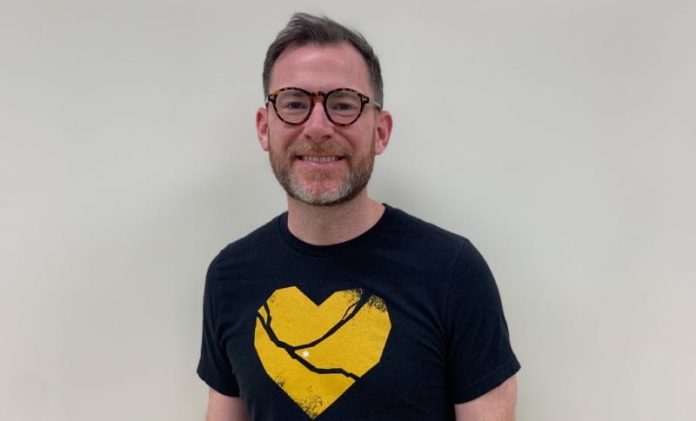
Alex Hobbs was coaching a youth soccer team last May when he felt a burning sensation in his stomach and chest.
He’d recently had a respiratory infection and assumed the discomfort was related.
Then he felt a familiar pain in his jaw. Alex knew he was having a heart attack.
As he waited for the ambulance, he acted composed. Inside, he was terrified.
This can’t be happening again, he thought.
Six years earlier, Alex, who lives in Robinson Township, Pennsylvania, had his first heart attack. He was 33 years old.
It was a bitterly cold February afternoon. Alex was training for a half-marathon and had run that morning.
Sitting down in front of the television, he felt sick to his stomach. Then the pain came on strong. In his chest. Down his left arm. Up into his jaw.
He wanted to just lie down and rest, but his wife, Beth, took him to the hospital.
That evening, he received two stents to clear major blockages in two arteries.
Doctors told Alex he didn’t have any heart damage but he should take off a few weeks from his job as a high school math teacher to recover.
The cardiologist told Alex he was in such good physical condition that cardiac rehab wasn’t necessary.
Alex had grown up playing soccer and basketball and had been a coach for more than a decade. He also ran and did weight training.
Considering his athleticism and age, a heart attack came as a shock. He had no known family history of heart disease. Alex craved an explanation from doctors about the source of his blockages.
Doctors said only that he had “sticky cholesterol,” which can lead to more plaque buildup in the arteries. He would have to live with some level of uncertainty, they said.
To a math teacher used to solving problems, that felt unbearable.
“After a month, I felt fine physically,” Alex said. “But inside, I was a wreck.”
He stopped lifting heavy weights, fearful it would strain his heart. He was afraid to sleep because he worried he might not wake up.
And he didn’t want to leave the house, self-conscious that the many people he knew around town would ask him about the heart attack. It made him feel weak, even embarrassed.
“It was the first time I’d ever had feelings of depression,” he said. “It was awful.”
Beth didn’t know how to help her husband.
“Alex prides himself in being healthy and fit,” she said. “It was really hard for him emotionally and stressful for us. He presented like a happy guy, but it was just for show.”
Alex was prescribed medication for anxiety and depression. He resisted taking it at first, feeling that it was “cheating.” He eventually tried it, didn’t feel it helped and stopped.
While recovering from the first heart attack, Alex vowed to get in even better shape. He exercised even more and dropped 20 pounds, from 195 to 175 (he’s 6 feet tall).
But as his depression continued, he exercised less, ate more and began relaxing with a glass or two of red wine most nights. More recently, during the COVID-19 pandemic, he became even less active.
Eventually, he gained back the 20 pounds he’d lost and then gained 30 more.
Between his first heart attack in 2015 and the second, plaque had built up on his arteries. His blood pressure and cholesterol levels were elevated.
After the second heart attack, he received two more stents.
This time, doctors told him he would need to make some serious lifestyle changes to improve his health and reduce the risk of another heart attack.
“It was a moment where I knew I had a decision to make about how my life needed to be lived to be there for myself and for my family,” Alex said. He and Beth have three children, ages 10, 12 and 14.
As soon as he returned home, Alex started a plant-based diet and stopped drinking almost entirely. He started walking, then running. By the holidays, Alex had dropped the 50 pounds he’d gained, returning to 175 pounds.
Beth, who loves to cook, is learning to create dishes the entire family likes, while still sometimes serving meat to the children. Her go-to dish has become Buddha bowls filled with hummus, quinoa and marinated vegetables.
“I first made it for Alex, but now we all love them,” she said.
Not only does Alex, who recently turned 40, feel better than he ever has physically, his depression and anxiety have lifted. He meditates and writes a journal and a blog about healthy living.
“My goal now is to help people understand the power of their food choices and physical activity, as well as how to help with the mental part,” he said. “I want people to know that it can truly change your life.”
Written by Diane Daniel.
If you care about heart attack, please read studies about deadly spider that could help treat heart attacks, and findings of new way to increase survival in a heart attack.
For more information about heart health, please see recent studies about people with this personality trait more likely to have heart attacks, and results showing that dietary supplements may prevent heart disease, stroke effectively.



